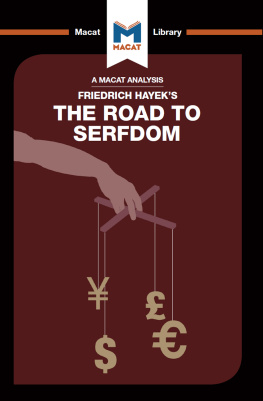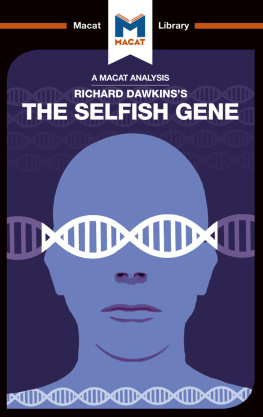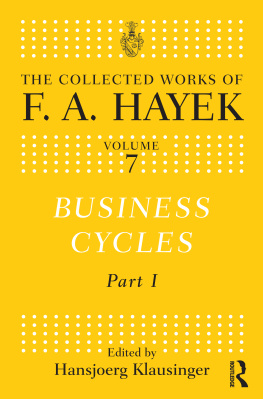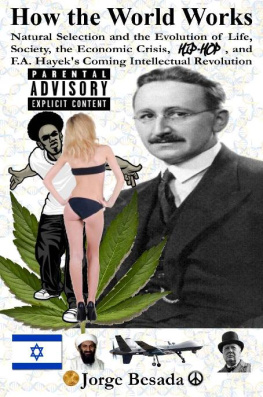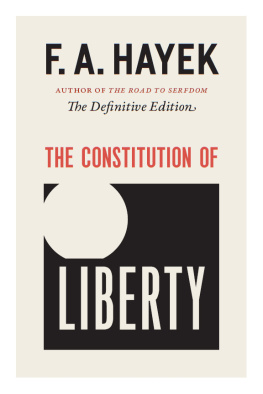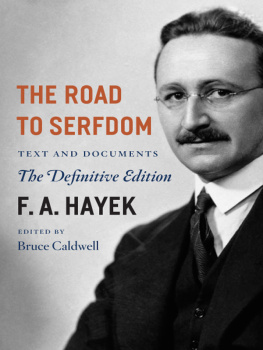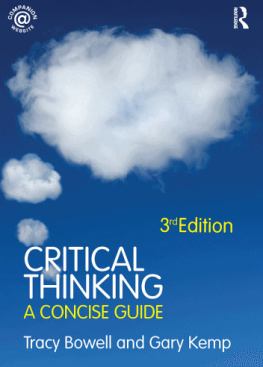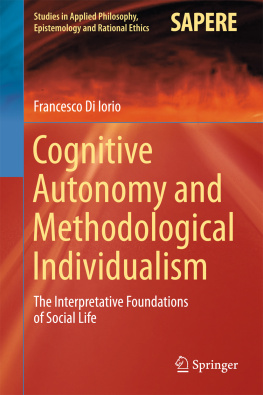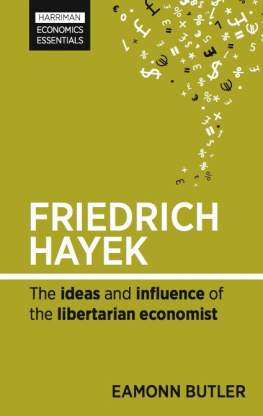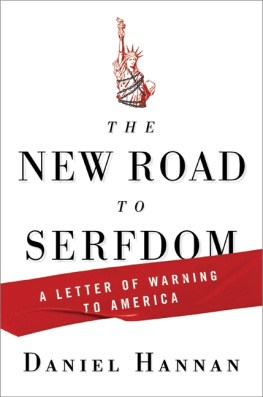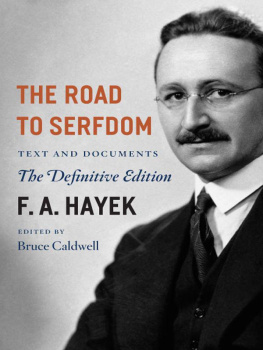Contents


An Analysis of
Friedrich Hayeks
The Road to Serfdom
David Linden
with
Nick Broten

Copyright 2017 by Macat International Ltd
24:13 Coda Centre, 189 Munster Road, London SW6 6AW.
Macat International has asserted its right under the Copyright, Designs and Patents Act 1988 to be identified as the copyright holder of this work.
The print publication is protected by copyright. Prior to any prohibited reproduction, storage in a retrieval system, distribution or transmission in any form or by any means, electronic, mechanical, recording or otherwise, permission should be obtained from the publisher or where applicable a license permitting restricted copying in the United Kingdom should be obtained from the Copyright Licensing Agency Ltd, Barnards Inn, 86 Fetter Lane, London EC4A 1EN, UK.
The ePublication is protected by copyright and must not be copied, reproduced, transferred, distributed, leased, licensed or publicly performed or used in any way except as specifically permitted in writing by the publishers, as allowed under the terms and conditions under which it was purchased, or as strictly permitted by applicable copyright law. Any unauthorised distribution or use of this text may be a direct infringement of the authors and the publishers rights and those responsible may be liable in law accordingly.
www.macat.com
info@macat.com
Cover illustration: Etienne Gilfillan
Cataloguing in Publication Data
A catalogue record for this book is available from the British Library.
Library of Congress Cataloguing-in-Publication Data is available upon request.
ISBN 978-1-912302-24-6 (hardback)
ISBN 978-1-912127-59-7 (paperback)
ISBN 978-1-912281-12-1 (e-book)
Notice
The information in this book is designed to orientate readers of the work under analysis, to elucidate and contextualise its key ideas and themes, and to aid in the development of critical thinking skills. It is not meant to be used, nor should it be used, as a substitute for original thinking or in place of original writing or research. References and notes are provided for informational purposes and their presence does not constitute endorsement of the information or opinions therein. This book is presented solely for educational purposes. It is sold on the understanding that the publisher is not engaged to provide any scholarly advice. The publisher has made every effort to ensure that this book is accurate and up-to-date, but makes no warranties or representations with regard to the completeness or reliability of the information it contains. The information and the opinions provided herein are not guaranteed or warranted to produce particular results and may not be suitable for students of every ability. The publisher shall not be liable for any loss, damage or disruption arising from any errors or omissions, or from the use of this book, including, but not limited to, special, incidental, consequential or other damages caused, or alleged to have been caused, directly or indirectly, by the information contained within.
CONTENTS
THE MACAT LIBRARY
The Macat Library is a series of unique academic explorations of seminal works in the humanities and social sciences books and papers that have had a significant and widely recognised impact on their disciplines. It has been created to serve as much more than just a summary of what lies between the covers of a great book. It illuminates and explores the influences on, ideas of, and impact of that book. Our goal is to offer a learning resource that encourages critical thinking and fosters a better, deeper understanding of important ideas.
Each publication is divided into three Sections: Influences, Ideas, and Impact. Each Section has four Modules. These explore every important facet of the work, and the responses to it.
This Section-Module structure makes a Macat Library book easy to use, but it has another important feature. Because each Macat book is written to the same format, it is possible (and encouraged!) to crossreference multiple Macat books along the same lines of inquiry or research. This allows the reader to open up interesting interdisciplinary pathways.
To further aid your reading, lists of glossary terms and people mentioned are included at the end of this book (these are indicated by an asterisk [*] throughout) as well as a list of works cited.
Macat has worked with the University of Cambridge to identify the elements of critical thinking and understand the ways in which six different skills combine to enable effective thinking.
Three allow us to fully understand a problem; three more give us the tools to solve it. Together, these six skills make up the PACIER model of critical thinking. They are:
ANALYSIS understanding how an argument is built
EVALUATION exploring the strengths and weaknesses of an argument
INTERPRETATION understanding issues of meaning
CREATIVE THINKING coming up with new ideas and fresh connections
PROBLEM-SOLVING producing strong solutions
REASONING creating strong arguments
To find out more, visit WWW.MACAT.COM.
CRITICAL THINKING AND THE ROAD TO SERFDOM
Primary critical thinking skill: REASONING
Secondary critical thinking skill: EVALUATION
Friedrich Hayeks 1944 The Road to Serfdom is a classic of conservative economic argument. While undeniably a product of a specific time in global politics which saw the threat of fascism from Nazi Germany and its allies beguilingly answered by the promises of socialism Hayeks carefully constructed argument is a fine example of the importance of good reasoning in critical thinking.
Reasoning is the art of constructing good, persuasive arguments by organizing ones thoughts, supporting ones conclusions, and considering counter-arguments along the way. The Road to Serfdom illustrates all these skills in action; Hayeks argument was that, while many assumed socialism to be the answer to totalitarian, fascist regimes, the opposite was true. Socialist governments reliance on a large state, centralised control, and bureaucratic planning he insisted actually amounts to a different kind of totalitarianism.
Freedom of choice, Hayek continued, is a central requirement of individual freedom, and hence a centrally planned economy inevitably constrains freedom. Though many commentators have sought to counter Hayeks arguments, his reasoning skills won over many of the politicians who have shaped the present day, most notably Margaret Thatcher and Ronald Reagan.
ABOUT THE AUTHOR OF THE ORIGINAL WORK
Born in Vienna, Austria, in 1899, Friedrich Hayek would go on to found the influential Austrian Institute of Economic Research. After teaching at the London School of Economics in the 1930s, Hayek became a British subject in 1938, the year Austria was annexed by Adolf Hitlers Germany. Hayek was concerned about how tyranny could develop out of excessive government control of economic planning. This led him to write The Road to Serfdom. Hayek would become one of the most influential political economists of the twentieth century. He died in 1992 at the age of 92.
ABOUT THE AUTHOR OF THE ANALYSIS
David Linden is doing postgraduate work on the new right at Kings College London. He works as an editor at Svenskt Militrhistoriskt Bibliotek in Stockholm.

